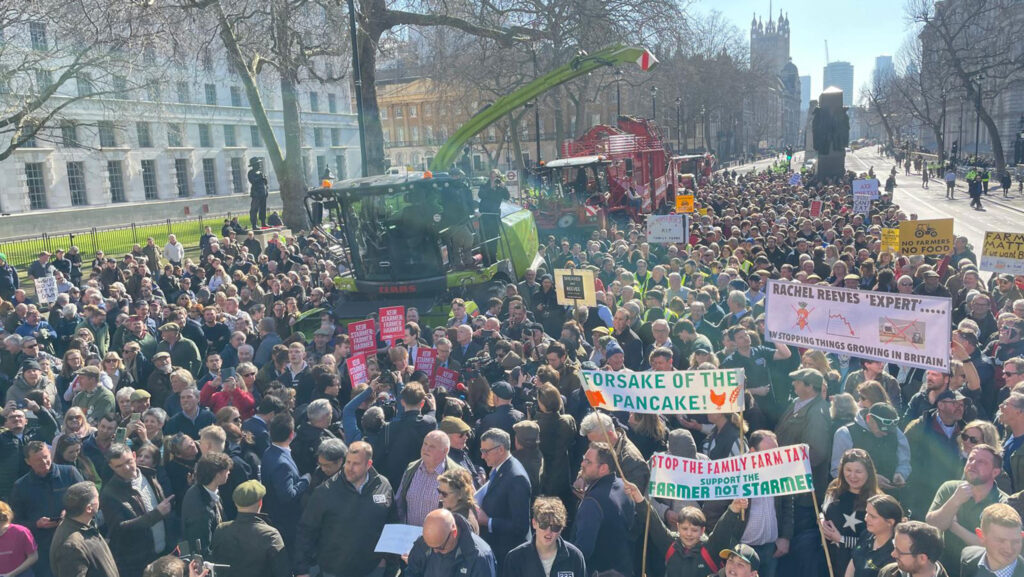Farmers gear up for fresh round of demonstrations
 © MAG/Farmers Weekly
© MAG/Farmers Weekly Another “autumn of discontent” is brewing as farmers and landowners gear up for a further round of lobbying to try to secure changes to the so-called “family farm tax”.
With the government seemingly determined to introduce a 20% inheritance tax (IHT) on farm and business assets of more than £1m from April 2026, grassroots farmers are preparing for further demonstrations.
See also: Record farm closures amid IHT reforms and rising costs
Shropshire tenant farmer and Farmers To Action co-ordinator Alan Hughes confirmed his group would be organising a major rally to coincide with the Labour Party conference in Liverpool on Sunday 28 September.
“We want to show that imposing IHT on farms is just not tenable, especially when we have heard from Donald Trump this week how estate tax has been almost phased out in the US to end the number of suicides amongst farmers,” he said.
“We have already seen some suicides in this country due to the threat of IHT and the low margins that farmers are making.”
Merseyside farmer Olly Harrison, one of a group of farmers who helped organise IHT protests last winter, told Farmers Weekly there could be fresh protests in London this autumn.
“The organisers of the first London protest have agreed a provisional date with the Met Police for further protest action, should it be needed,” he said.
“This is not something farmers want to do, but feel it is necessary.”
Trump praised for stance on ‘death tax’
Farm leaders have praised US president Donald Trump after he strongly defended the principle of protecting farms from “estate tax” – the US equivalent of inheritance tax (IHT).
Asked about the IHT situation during a press conference with UK prime minister Sir Keir Starmer in Scotland on 28 July, Mr Trump said he loved farmers, but they were often “land rich and cash poor”.
He claimed that all too often, farming families had been forced to borrow money to pay the 50% “death duty” and this had led to bankruptcies and, in some cases, suicides.
Mr Trump claimed to have ended the tax so that “when a parent leaves a farm to the kids, they do not have to worry about their local banker coming in and stealing their farm”.
This was later shown to be an exaggeration – estate tax does still exist, though the threshold above which it becomes payable more than doubled to $11.5m per person in Mr Trump’s first presidency, and is set to reach $15m next year, taking most farms out of the tax bracket.
NFU president Tom Bradshaw praised the US president for recognising that IHT is not conducive to running family businesses and was having a detrimental impact on food production and farmers’ wellbeing.
“As is right in that situation, he took action to rectify the policy,” he said.
Labour MPs
Meanwhile, the Country Land and Business Association (CLA) says it is directing its focus to those Labour MPs it feels may be prepared to vote against the government over the IHT issue.
CLA director of external affairs Jonathan Roberts said: “We know from the welfare reform debacle that it takes around 80 rebel Labour MPs to make the whips sweat. We think we have around 40.
“Put simply, we need urban Labour MPs to come to our cause too – and we are working on that by reminding them there are many family businesses in towns and cities being devastated by these reforms too.
“Government thinks our campaign will just die down, but they’ve seriously underestimated our stamina.”
Farmer opinion
The plans for renewed action come as Defra’s latest Farmer Opinion Tracker for April 2025 highlights the dwindling level of confidence among farmers, with 72% saying they are “not at all confident that changes to schemes and regulations will lead to a successful future for farming”.
The survey reveals there were a large number of farmer comments concerning IHT, national insurance, Basic Payment Scheme withdrawal and, more recently, the suspension of the Sustainable Farming Incentive in England.
“Compared to past opinion trackers, there was a much greater feeling in April 2025 that farmers could not trust Defra and the government to support them, or to continue to fund ELM schemes,” it said.
The Office for National Statistics has also published new data, showing that a record 6,365 rural businesses closed in the past year, the highest number since quarterly data was first collected in 2017.
Most of these closures occurred in the six months since last autumn’s Budget.
Shadow Defra secretary Victoria Atkins blamed the “crippling” national insurance increases, alongside the planned family farm tax.
“These are destroying generational businesses, creating job instability and even leading to devastating suicides,” she said.
